
Why we need social entrepreneurship
"Globally, there are massive gaps to finance the Sustainable Development Goals (SDGs). According to who is the private sector (Convergence, 2018 ). It is estimated that a total of USD 2.5 trillion per year is required to meet SDG targets up to 2030. This is equivalent to the annual GDP of France."
As one of the solutions for that, social entrepreneurship is at the heart of the discussion of the event hosted by Swiss Agency for Development (SDC) in China on Oct.17-18 2018 in Beijing. The theme of the annual event is "Social Entrepreneurship & Innovative Finance for Rural-Urban Transformation".
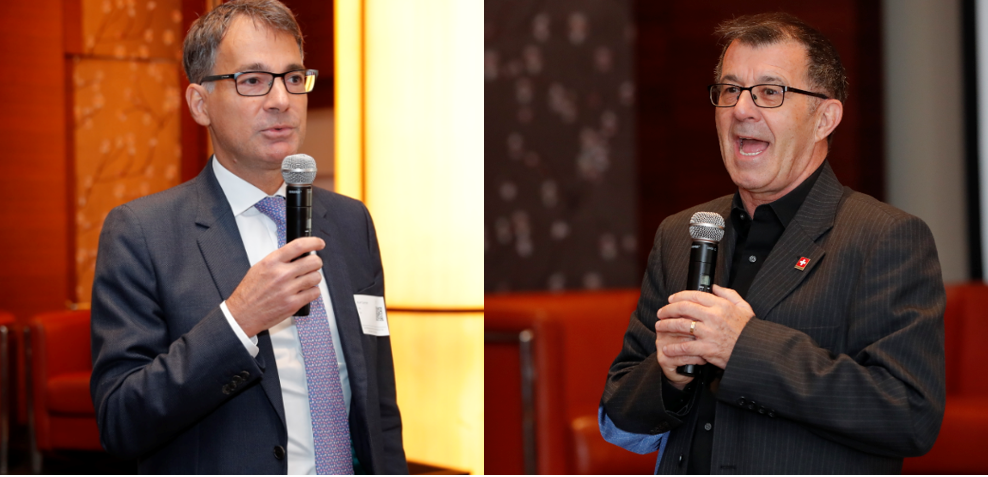
About 70 representatives from Europe, China, Korea and Mongolia gathered in Beijing to discuss what social entrepreneurship is and how to foster its eco-system.
Mr. Alain Gaschen (left), minister of Swiss Embassy in China highlighted in the opening remarks, "Being a social entrepreneur, he/she should enjoy to go extra mile to find solutions for quite complex questions and they should not scare of making mistakes".
Mr. Felix Fellmann (right), counsellor of the Swiss Embassy, pointed out that social entrepreneurship needs continuous learning and encourage to make change. More young people should join in to the social change in order to make a better world.
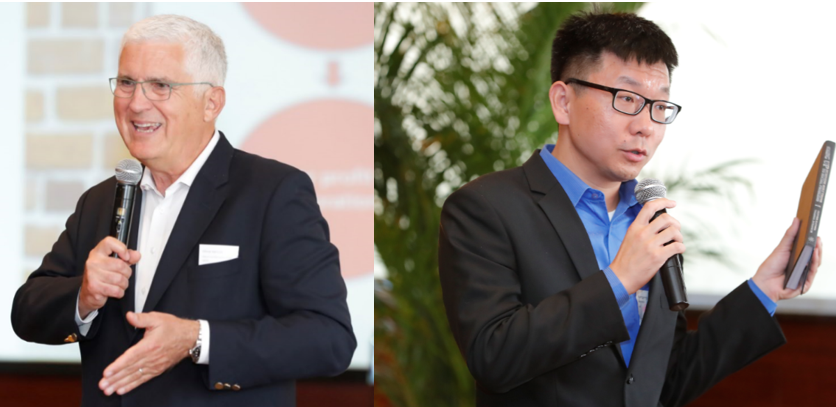
Mr. Olivier Kayser, partner and managing director of Hystra shared with the audience that the trend of sector convergence between NGOs and business cooperation, which was not the case in the past. Many of them are realizing the needs to pave the way for sustainable development. Social entrepreneurship is a new emerging business model to tackle most critical social issues, such as education, human health, environment, etc. with entrepreneurship, which might bring about a radically new solutions with the potential to revolutionize a whole sector.
"Traditionally, at the global level, there are two kinds of funding sources for SDGs, namely Official Development Assistance (with a total amount of 146 billion USD by 2016) and Philanthropic flow ( with a total amount of 32 billion USD by 2016) . However, it is far more than enough to solve all issues. Taking poverty alleviation as an example, there are in total of 4 billion people who are living under the poverty line, with less than USD 2,000 income per year. Despite the vastness of this market, it remains largely untapped by the private sector, highlighted by Prof. Jia Xiangping, co-founder of E&T forum.

Story of social enterprise
Mr. Lars Stein, Asoka fellow and SDC senior advisor of Competence Centre (left top 1), shared his story of providing loads to young professionals who want to continue their education and fight for better career development.
As an active actor on social innovation in China during the last 10 years, Youchange Foundation is initiating a number of programs, making sure it has both social and economic benefit and able to create sustainable solutions for philanthropic fund
( right top 1).
CFPA microfinance is one of the biggest finance provider in China with the aim to support small farmers. Mr. Liu Dongwen (left down 1) underscored that a total amount of 38 billion RMB is provided as loan to their customers among which 93% are farmers or farm cooperation with a high proportion of women.
As a pioneer business player in China on anti-desertification, Elion Resource Group used to be a small factory surrounded by endless desert in Inner Mongolia and strived to build roads for salt delivery. Mr. Zhanyi WANG (right down 1),executive director, Elion foundation stated " The roads we built can be easily destroyed by desert over nights and Elion has to fight with desert since we want to live on. "After more than 30 years' continuous efforts, they found innovative solutions to combat desertification and won the attention globally.
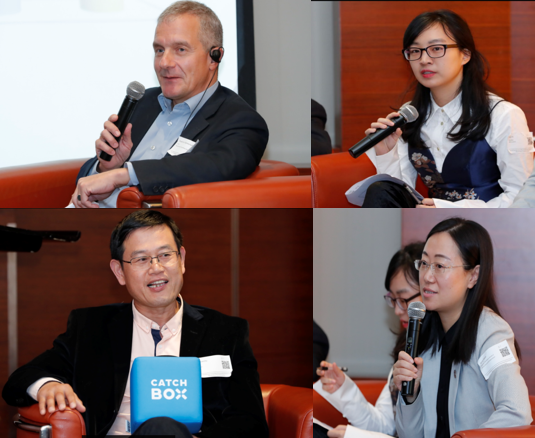
What is social entrepreneurship
Mr. Stephan Dyckerhoff (left top 1),pesident Buurtzorg Asia stated that social enterprises should put solving social issues as the core of their business and differentiate from NGO or foundation.
Ms. Luo Yi (right top 1), founder of Laotu pointed out that globally, there are two schools of definition on social entrepreneurship-American and British notions. Social entrepreneurship should know how to balance economic and social profit by the heart.
Prof. Xu Jianchu (left down 1), profession of
Kunming Institute of Botany of CAS, underlined that charity is not social enterprise. "Social enterprises should tackle existing social problems innovatively, and manage the relationship between community, enterprise and scientist smartly.
Ms. Miao Qing (right down 1),Deputy Secretary General, YouChange foundation, pointed out that social entrepreneurship is the driving force towards social change. Charity or philanthropy is not sufficient to solve all the issues. It is critical to empower the people so that they can be the change maker.
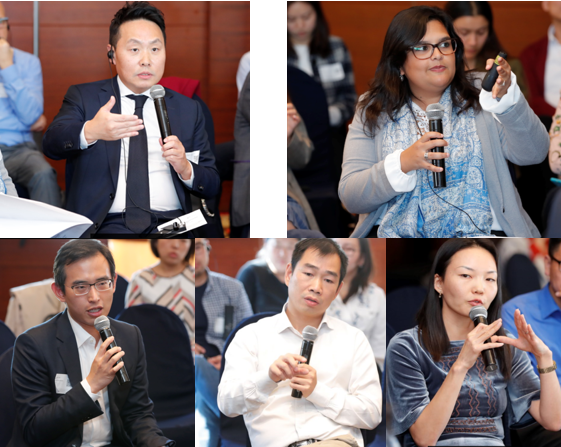
How to build up enabling eco-system for social entrepreneurship
In the discussion, we found that start-ups of social entrepreneurship are lacking of the capacity to attract commercial investment. According to Madam Naeeda (right top 1), policy analyst of OECD, blended finance with private and public found is emerging as innovative finance to support such start-ups. However, blended finance needs to be carefully designed in accordance to the legal context.
Mr. Hyde Chen (left down1) director, UBS AG,
stressed that mobilizing private capital is very critical for responsible investment. It has been observed that many private customs of UBS are willing to invest on projects with social benefit and economic returns.
Mr. Guo Peiyuan ( left down 2), general manager of SynTao stated that the key word for social enterprise is the latter one. In China, the enabling environment is forming. Taking green finance as an example, we see that green bond, green credit or foundation have developed quite a lot in China, which will benefit the social entrepreneurship development.
Representative from Mongolian social entrepreneur, Ms. Enkhzul ( right down 1) stated there is no definite answer for the best model of social entrepreneurship. Three elements lie in the core of the system- government, individual and social issues. Social enterprise has many chances in developing countries since there are many issues not solved yet.
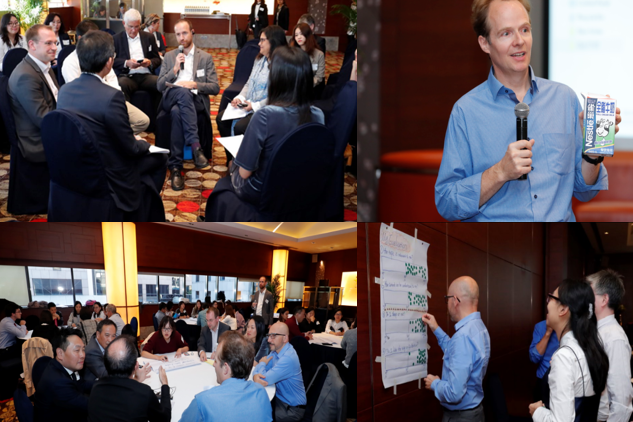
What should we do?
During the world coffee session, three questions were discussed: What we are good for social entrepreneurship? What can be improved? What need to be done immediately?
Mr. Juerg ZAUGG (right top 1), head of agriculture service, Nestlé China, shared with audience the story of Dairy Farm Institute in Heilongjiang Province. He underscored that Nestlé is investing DFI from it is own profit in order to build up a joint learning platform. It is expected that it can benefit all the members of the whole value chain, in particular private farmland owner. Nestlé believe that some critical issues can also be solved as farmers income and education level is improved dramatically.
